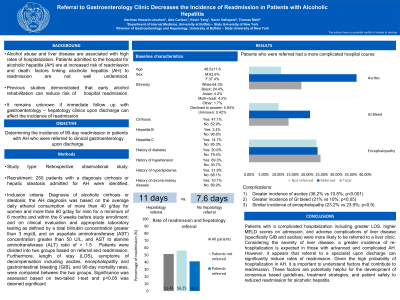Sunday Poster Session
Category: Liver
P0954 - Referral to Gastroenterology Clinic Decreases the Incidence of Readmission in Patients With Alcoholic Hepatitis
Sunday, October 22, 2023
3:30 PM - 7:00 PM PT
Location: Exhibit Hall

Has Audio

Nariman Hossein-Javaheri, DO
University at Buffalo
Buffalo, NY
Presenting Author(s)
Nariman Hossein-Javaheri, DO, Alexander M. Carlson, DO, Kevin Yang, MD, Naren S. Nallapeta, MBBS, Thomas C. Mahl, MD
University at Buffalo, Buffalo, NY
Introduction: Alcohol abuse and liver disease are associated with high rates of hospital readmission, but factors linking alcoholic hepatitis (AH) to readmission are not well understood. Specifically, we aimed to determine the incidence of 90-day readmission in patients with AH who were referred to clinical gastroenterology upon discharge.
Methods: 250 patients with a diagnosis cirrhosis or hepatic steatosis admitted for AH were identified and divided into two groups based on referral and readmission. Furthermore, length of stay (LOS), symptoms of decompensation including ascites, encephalopathy and gastrointestinal bleeding (GIB), and 90-day mortality rates, were compared between the two groups. Significance was assessed based on a two-tailed t-test and p< 0.05 was deemed significant.
Results: Readmission rate in persons who were referred to outpatient gastroenterology was 41% vs 52.6% in those who were not referred (p=0.03). Those who were referred had a complicated hospitalization with a greater LOS (11 vs 7.6 days; p=0.02), higher MELD scores (15 vs 9; p< 0.001), and greater incidence of GIB (21% vs 10%; p< 0.05) and ascites (36.2% vs 10.8%; p< 0.001) but not encephalopathy (23.2% vs 23.9%; p=0.9). Although patients who were referred to the clinic had decreased 90-day mortality (5.8% vs 10.2%), the difference between the two groups was not significant (p=0.1).
Discussion: Referral to gastroenterology significantly reduces the rate of 90-day readmission in patients with AH. Patients with a complicated hospitalization including greater LOS, higher MELD scores on admission, and adverse complications of liver disease (specifically GIB and ascites) were more likely to be referred to a liver clinic. Considering the severity of liver disease, a greater incidence of re-hospitalization is expected in those with advanced and complicated AH. However, it appears that referral to a specialist upon discharge can significantly reduce rates of readmission but does not affect 30 and 90-day mortality rates. Given the high probability of hospitalization in AH, it is important to understand factors that contribute to readmission. These factors are potentially helpful for the development of consensus-based guidelines, treatment strategies, and patient safety to reduced readmission for alcoholic hepatitis.
Disclosures:
Nariman Hossein-Javaheri, DO, Alexander M. Carlson, DO, Kevin Yang, MD, Naren S. Nallapeta, MBBS, Thomas C. Mahl, MD. P0954 - Referral to Gastroenterology Clinic Decreases the Incidence of Readmission in Patients With Alcoholic Hepatitis, ACG 2023 Annual Scientific Meeting Abstracts. Vancouver, BC, Canada: American College of Gastroenterology.
University at Buffalo, Buffalo, NY
Introduction: Alcohol abuse and liver disease are associated with high rates of hospital readmission, but factors linking alcoholic hepatitis (AH) to readmission are not well understood. Specifically, we aimed to determine the incidence of 90-day readmission in patients with AH who were referred to clinical gastroenterology upon discharge.
Methods: 250 patients with a diagnosis cirrhosis or hepatic steatosis admitted for AH were identified and divided into two groups based on referral and readmission. Furthermore, length of stay (LOS), symptoms of decompensation including ascites, encephalopathy and gastrointestinal bleeding (GIB), and 90-day mortality rates, were compared between the two groups. Significance was assessed based on a two-tailed t-test and p< 0.05 was deemed significant.
Results: Readmission rate in persons who were referred to outpatient gastroenterology was 41% vs 52.6% in those who were not referred (p=0.03). Those who were referred had a complicated hospitalization with a greater LOS (11 vs 7.6 days; p=0.02), higher MELD scores (15 vs 9; p< 0.001), and greater incidence of GIB (21% vs 10%; p< 0.05) and ascites (36.2% vs 10.8%; p< 0.001) but not encephalopathy (23.2% vs 23.9%; p=0.9). Although patients who were referred to the clinic had decreased 90-day mortality (5.8% vs 10.2%), the difference between the two groups was not significant (p=0.1).
Discussion: Referral to gastroenterology significantly reduces the rate of 90-day readmission in patients with AH. Patients with a complicated hospitalization including greater LOS, higher MELD scores on admission, and adverse complications of liver disease (specifically GIB and ascites) were more likely to be referred to a liver clinic. Considering the severity of liver disease, a greater incidence of re-hospitalization is expected in those with advanced and complicated AH. However, it appears that referral to a specialist upon discharge can significantly reduce rates of readmission but does not affect 30 and 90-day mortality rates. Given the high probability of hospitalization in AH, it is important to understand factors that contribute to readmission. These factors are potentially helpful for the development of consensus-based guidelines, treatment strategies, and patient safety to reduced readmission for alcoholic hepatitis.
Disclosures:
Nariman Hossein-Javaheri indicated no relevant financial relationships.
Alexander Carlson indicated no relevant financial relationships.
Kevin Yang indicated no relevant financial relationships.
Naren Nallapeta indicated no relevant financial relationships.
Thomas Mahl indicated no relevant financial relationships.
Nariman Hossein-Javaheri, DO, Alexander M. Carlson, DO, Kevin Yang, MD, Naren S. Nallapeta, MBBS, Thomas C. Mahl, MD. P0954 - Referral to Gastroenterology Clinic Decreases the Incidence of Readmission in Patients With Alcoholic Hepatitis, ACG 2023 Annual Scientific Meeting Abstracts. Vancouver, BC, Canada: American College of Gastroenterology.
